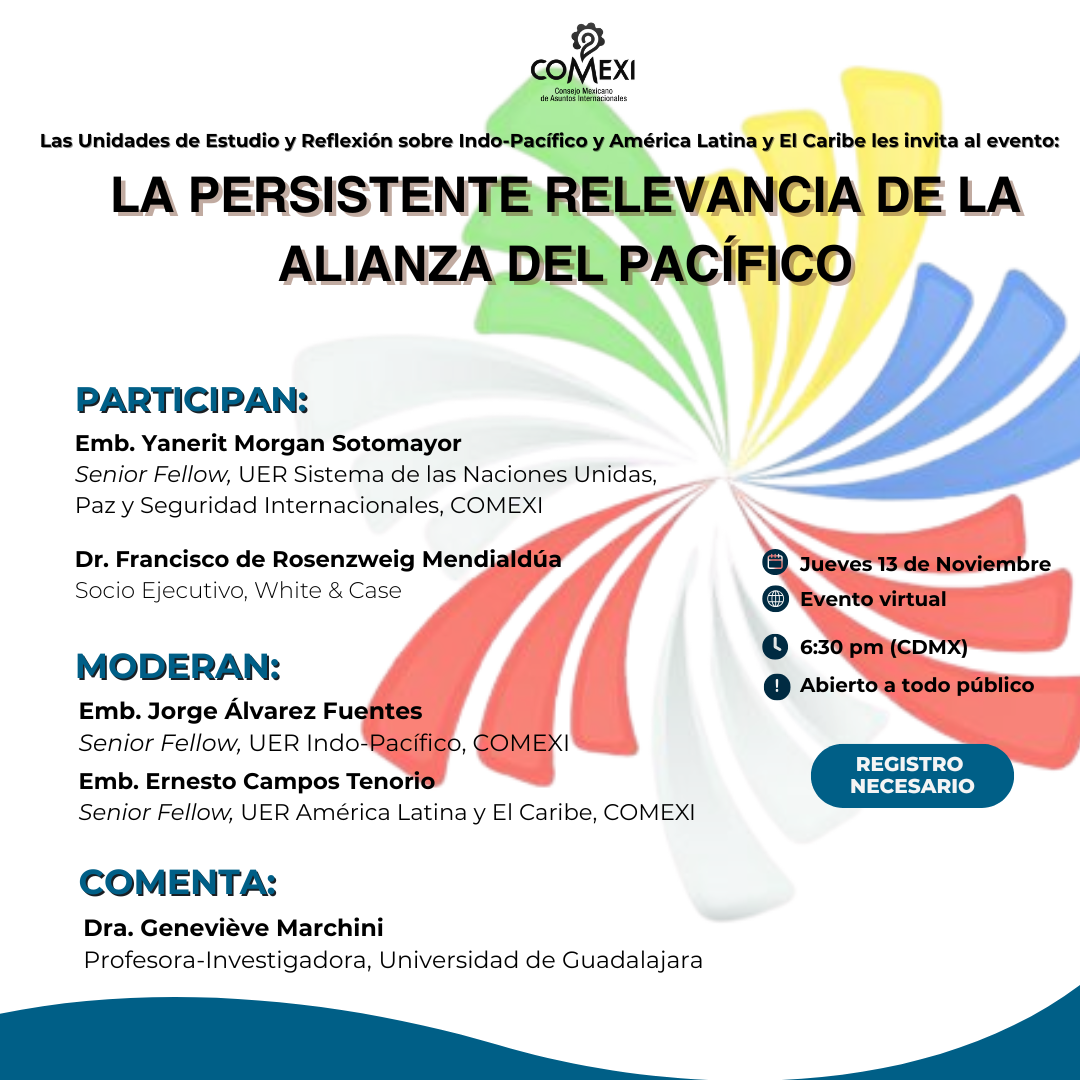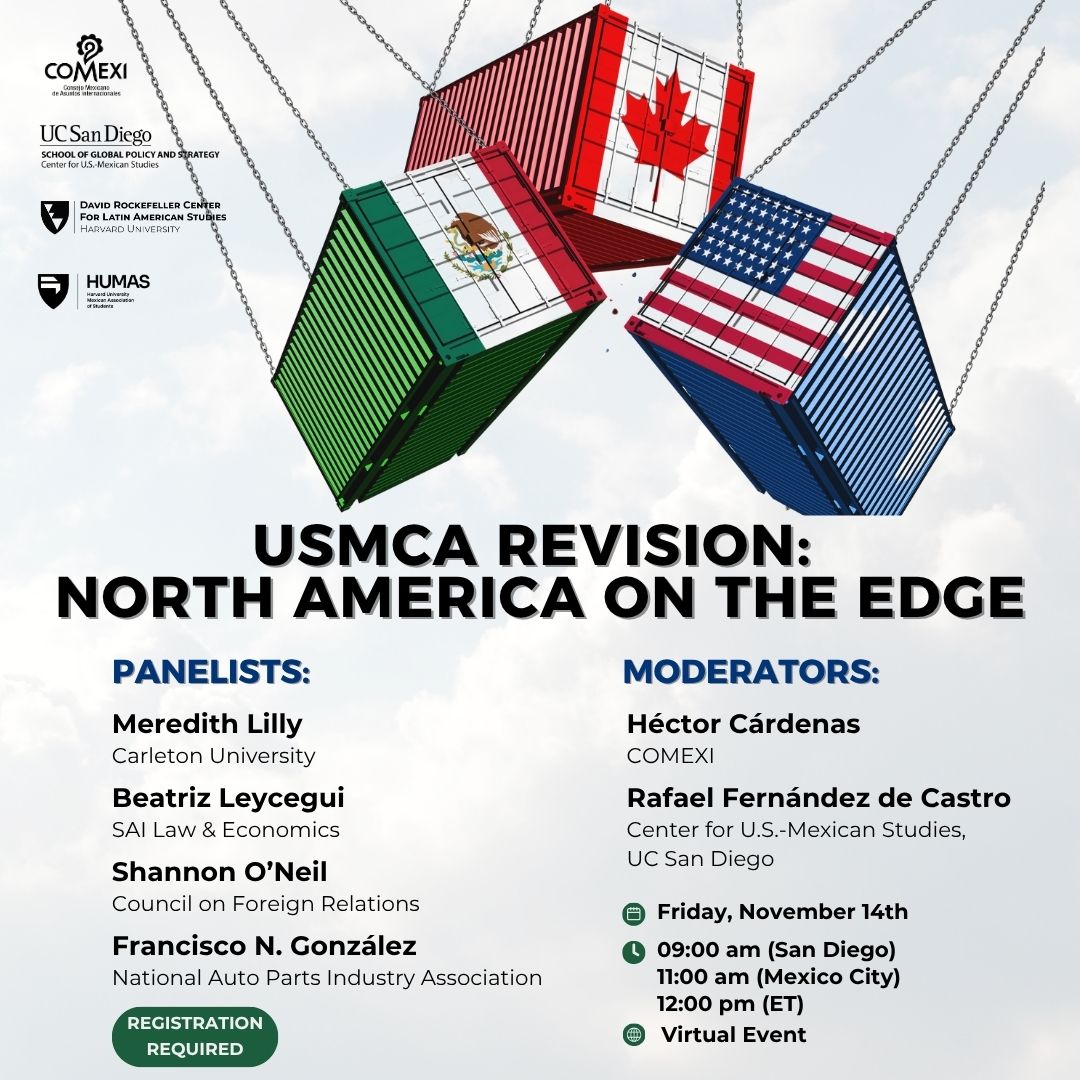The Mexican Council on Foreign Relations (COMEXI) features Profe. Brenda Schaffer (Georgetown University) presenting the report "Occupied Elsewhere:Selective Policies on Occupations, Protracted Conflicts, and Territorial Disputes". This dialogue took place on Thursday, March 5th in Mexico City and was moderated by Verónica Ortiz, General Director of COMEXI.
After a brief introduction Veronica Ortiz, Executive Director of COMEXI, Brenda Shaffer begins the dialogue by explaining how the complexity and amount of conflicts around the globe is one of the reasons why so many go unnoticed. Disputes, occupations and civil wars in multiple regions present a challenge for governments, institutions and academics, who don’t know where to focus their attention. This results in many of them being ignored by the International System.
Therefore, the report “Occupied Elsewhere: Selective Policies on Occupations, Protracted Conflicts, and Territorial Disputes” gives visibility to all these problems that are not studied nor solved. She then continues to explain why these specific conflicts should be studied, arguing that after World War II, a new institutionalized system appeared and with it, different positions regarding colonialism and occupations. During the Cold War, one side saw the interventions as a way for liberation from tyranny, the other saw it as an invasion. This continues to happen today, because the system creates differences and it has divided the world in multiple regions where many countries live in a legal void; so, the institutions and governments are unable disputes in those territories.
Shaffer describes how important it is to study and recognize these occupations is, not just for international Human Rights Organizations (IHO’s), but for businesses as well. The private enterprises must understand such conflicts in order to help, prosper and keep trade with different part of the world; the reason being that business with one party can mean hostilities with another.
She then proceeds to list the main results of the report, which are: a) One cannot have an ambiguous policy in an interconnected world; b) the International System changes its response to conflicts based on the interest of governments and even civil society, while giving more attention to those that are covered by the media; c) many conflicts go unnoticed because the occupants use proxy strategies and little use of physical violence. These results demonstrate the flaws of the system, one that is biased and therefore cannot identify proxy regimes.
Brenda Shaffer explains then why Mexico should care about conflicts in the Caucasian region. First, because it is a country that defends independence and it has an historical responsibility against interventions. Second, today the United States has a renewed peace process for the world, so the Mexican government will need a stance regarding occupations and refugees.
Once the context is clear, she opens the dialogue for further discussion. As mediator, Veronica Ortiz begins by adding that Mexico should care about such conflicts because it is currently applying for a seat in the United Nations’ Security Council. The question being: how much a priority should these conflicts be?
Shaffer answers by emphasizing to main points: The Security Council and the United Nations are the creators of today’s institutionalized system, but they have agendas that almost never touch these conflicts. In addition, there is inconsistency with the recommendations emitted by the UN sanctioning some occupations but ignoring many others; because there are many reports denouncing Human Rights violations in Syria and Yemen, but non for Azerbaijan, Armenia, Georgia and many other crises.
The next question is in relation to the refugees, on how it affects the visibility of conflicts and the reaction of European governments. To which she answers that this is yet another flaw of the legal international basis. While Turkey has accepted most of the refugees since 2001, the EU has accused the Turkish government multiple times of Human Rights violations. Refugees depend on perspective, same as any other type of displacement.
The audience then proceeds to ask questions. The first is related to Shaffer’s introduction about how the system after World War II did not attend many of the occupations. She answers by specifying that the international law order was just beginning in 1945; the world was different, and its reactions varied greatly. Occupations today have changed and the countries in which they occur are often the result of geographic fractioning, so many haven’t had the chance to integrate to the system. She adds that, even though some laws have been established, they do not contemplate proxy regimes.
The second intervention of the audience notes that these are all different conflicts that have their own contexts. Why, then, should they be studied under the same scope? Shaffer responds that all of them are different, and ideally, they should be addressed with their own specifications while also treating them with equal importance. But the reality is other. Facts show that interconnection affects geopolitics and businesses alike, it does not depend on how the occupation happened and on their culture. Even though there are cultural differences, international policies should not be based on history books, but in the general organizational principles that work the best.
The next question from the audience notes that these are not conflicts people hear in Mexico. Therefore, how can the disputes become more visible? The answer, argues Shaffer, it is that visibility depends on what exactly do governments engage with. The world is unlikely to have one single, great sense of morality so it really is up to the States’ agendas. On the other hand, she does single out the responsibility of IHO’s, simply because that is what they do. They are the ones that should communicate the occupations, nevertheless they often cover all conflicts. She also clarifies that in the individual scope, these conflicts should be visible depending on the working sector. For example, if a person works on the Foreign Ministry and has to take a position regarding a new proxy republic, or even members of Congress that have reunions with businessmen or representatives of such republics; then de visibility is obligated by the job.
A member of the audience then asks what is Shaffer’s opinion on the European Neighbor policy and how does it affect trade with the occupied territories? She answers that this policy a perfect example of good intentions but ambiguous position. It is very inconsistent, and the result is that it benefits some trade products but affects diplomatic relations, or the other way around.
The next two questions are: what relation exists between the Armenian diaspora living in the United States and the way the US addresses the Armenian Occupation? And, during the last couple of weeks Russian president Vladimir Putin has been imposing reforms, one for Russia to not give away their territorial integrity to another powers; how does this affect proxy regimes?
Shaffer answers the first question by specifying that the Armenian-American diaspora does not have any influence whatsoever with the US administration nor the military. They do have an important lobbying position in Congress though. An example of this is the John Kerry enaction of the 907 section that blocked government to government assistance in the Armenian conflict. Regarding Russia, it is unlikely they get reclamations from the system, especially because of the proxy regimes that cannot be addressed by the international law system. If they do not admit the existence of Russian backed governments, then it cannot receive any real attention.
The final question is about how governments should react to such occupations, mainly in the case of Azerbaijan and Armenia. Shaffer explains that it depends on the government, but the best approach is the business one, because it does not have the historical difficulties of other solutions. The first step to solve such countries is to recognize there is a conflict, but that depends on the States’ interest; business and trade is one of the most important interest for countries. She concludes that the International System should deal more with long term solutions for important problems and not just with short term positions for urgent ones.
Elaborado por Alejandro Hernández Buen Abad





